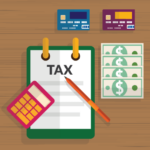
Scam Alert: Fake Calls from Taxpayer Advocate Service
 Like clockwork, every year, there’s a new twist on old scams. This year, it is the IRS impersonation phone scam whereby criminals fake calls from the Taxpayer Advocate Service. The TAS is an independent organization within the IRS that help protect your taxpayer rights. TAS can help if you need assistance resolving an IRS problem, if your problem is causing financial difficulty, or if you believe an IRS system or procedure isn’t working as it should. Typically, a taxpayer would contact TAS for help first, and only then would TAS reach out to the taxpayer. TAS does not initiate calls to taxpayers out of the blue.
Like clockwork, every year, there’s a new twist on old scams. This year, it is the IRS impersonation phone scam whereby criminals fake calls from the Taxpayer Advocate Service. The TAS is an independent organization within the IRS that help protect your taxpayer rights. TAS can help if you need assistance resolving an IRS problem, if your problem is causing financial difficulty, or if you believe an IRS system or procedure isn’t working as it should. Typically, a taxpayer would contact TAS for help first, and only then would TAS reach out to the taxpayer. TAS does not initiate calls to taxpayers out of the blue.
How the scam works
Like many other IRS impersonation scams, thieves make unsolicited phone calls to their intended victims fraudulently claiming to be from the IRS. In this most recent scam variation, callers “spoof” the telephone number of the IRS Taxpayer Advocate Service office in Houston or Brooklyn. Calls may be ‘robo-calls’ that request a call back. Once the taxpayer returns the call, the con artist requests personal information, including Social Security number or individual taxpayer identification number (ITIN).
In other variations of the IRS impersonation phone scam, fraudsters demand immediate payment of taxes by a prepaid debit card or wire transfer. The callers are often hostile and abusive. Alternately, scammers may tell would-be victims that they are entitled to a large refund but must first provide personal information. Other characteristics of these scams include:
- Scammers use fake names and IRS badge numbers to identify themselves.
- Scammers may know the last four digits of the taxpayer’s Social Security number.
- Scammers spoof caller ID to make the phone number appear as if the IRS or another local law enforcement agency is calling.
- Scammers may send bogus IRS emails to victims to support their bogus calls.
- Victims hear background noise of other calls to mimic a call site.
- After threatening victims with jail time or with, driver’s license or other professional license revocation, scammers hang up. Others soon call back pretending to be from local law enforcement agencies or the Department of Motor Vehicles, and caller ID again supports their claim.
Telltale signs of a scam call
While the IRS or the TAS will never do any of the following, scammers will often:
- Call to demand immediate payment using a specific payment method such as a prepaid debit card, gift card or wire transfer. Generally, the IRS will first mail a bill to any taxpayer who owes taxes.
- Threaten to immediately bring in local police or other law-enforcement groups to have the taxpayer arrested for not paying.
- Demand that taxes be paid without giving taxpayers the opportunity to question or appeal the amount owed.
- Ask for credit or debit card numbers over the phone.
- Call about an unexpected tax refund.
Tax scams can happen any time of year, not just at tax time and its important to stay alert to scams that use the IRS or other legitimate companies and agencies as a lure. If you have any concerns, please call the office.









Those IRS scams again. It seems like they are never get tired of trying to steal our money. People should be very familiar with these scams by now. I have done a little Google search about this scam and found some reports filed at https://www.whycall.me/760-810-4313.html since last year! Keep spreading the word about these scams to our family is the key to protect them.